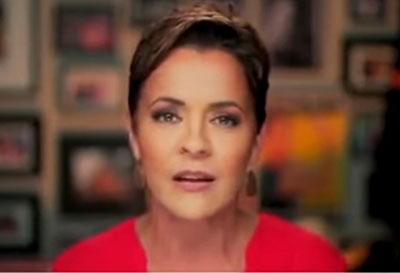by WorldTribune Staff, November 24, 2022
Major media outlets are mostly ignoring contested elections in Arizona and Brazil, but candidates who felt they were shafted in this year’s elections and their supporters are continuing to make their voices heard through alternative channels.
In Arizona, Republican candidate for governor Kari Lake has filed a lawsuit against Maricopa County election officials, demanding they provide information about voters whose ballots were affected by printer and tabulator malfunctions on election day. No such malfunctions occurred during the early voting period, reports have noted.

“We need information from Maricopa County. They ran the shoddiest election ever in history and we want some information,” Lake said in an interview on Steve Bannon’s War Room. “We’re on a timeline, a very strict timeline when it comes to fighting this botched election.”
Mark Sonnenklar, one of the roving attorneys working on behalf of the Republican National Committee’s Election Integrity program in Maricopa on election day, reported what he and 10 other roving attorneys “observed at a total of 115 vote centers out of a total of 223 vote centers in the county.”
“In many vote centers, the tabulators rejected the initial insertion of a ballot almost 100% of the time, although the tabulators might still accept that ballot on the second, third, fourth, fifth, or sixth attempt to insert the ballot,” Sonnenklar reported. “However, many ballots were not able to be tabulated by the tabulators at all, no matter how many times the voter inserted the ballot.”
In the Lake campaign’s lawsuit, Lake’s attorney alleges that as many as 118 polling centers in Maricopa County had malfunctioning printers and tabulators, leading to frustrated voters who were forced to wait in long lines or left without voting. The lawsuit requests that the court require the county’s election officials to provide public records before the canvassing deadline of Nov. 28, to give Lake’s campaign time to seek redress.
County election officials have claimed that only 70 polling centers had issues on election day.
“In the absence of an immediate and comprehensive production of the requested public records, (Kari Lake) cannot ascertain the full extent of the problems identified and their impacts on electors,” wrote Timothy La Sota, Lake’s attorney.
Lake’s lawsuit includes declarations from voters, some of whom shared that they ended up leaving due to long wait times, said they were afraid their votes weren’t properly counted, or personally witnessed chaotic conditions at poll sites.
I am ashamed to say I would not give this fellow a second thought if I passed him in the street. Having watched this speech, however, I am now in awe of his eloquence and patriotism.
Maricopa County is the new Zimbabwe. pic.twitter.com/BETZinTaZB
— James Woods (@RealJamesWoods) November 19, 2022
Abe Hamadeh, the GOP candidate for Arizona attorney general, has also sued Maricopa County, saying the Nov. 8 election was “materially afflicted with certain errors and inaccuracies in the management of some polling place operations and in the processing and tabulation of some ballots.” His allegations also parallel many of the same eyewitness accounts being reported in the Lake campaign’s lawsuit.
Hamadeh and his opponent Kris Mayes are currently separated by “just 510 votes out of more than 2.5 million ballots cast—a margin of two-one hundredths of one percent (0.02%).” Due to the slim margin, an automatic recount of the race has already been triggered.
Two Arizona counties, Cochise and Mohave, have delayed certification of the midterm election results.
New details on Arizona tabulatorspic.twitter.com/w26hJCEfMs
— Citizen Free Press (@CitizenFreePres) November 24, 2022
Kari Lake keeps fighting…pic.twitter.com/eW0x1rMkvA
— Citizen Free Press (@CitizenFreePres) November 24, 2022
In Brazil, meanwhile, former President Jair Bolsonaro has launched a challenge to the presidential election he recently lost to Lula da Silva, arguing that there are votes from some machines that should be “invalidated.”
Bolsonaro’s complaint reads: “There were signs of serious failures that generate uncertainties and make it impossible to validate the results generated’ in older models of the voting machines. As a result, Bolsonaro and his allies urged that the votes from those models should be “invalidated.”
Incumbent Jair Bolsonaro won 49.17 percent of the vote, compared to 50.83 by da Silva, who was convicted in 2017 for money laundering though a court threw out his conviction in March 2021.
Bolsonaro’s complaint concerns some 280,000 voting machines which were models deployed before 2020. Bolsonaro has previously claimed that Brazil’s electronic voting system is not fraud-proof.
While not conceding defeat, Bolsonaro has given the go-ahead for a presidential transition.
According to his party, if the votes in question were discounted, Bolsonaro would win re-election “with 51.05% of the valid votes, against 48.95% for Lula”.
Millions of Bolsonaro’s supporters immediately took to the streets in protest after da Silva was declared the winner and continue to do so.
BRAZIL: A revolution is currently underway as citizens rise up in protest over what they say is a “stolen” election. pic.twitter.com/54sBascO3X
— Katie Daviscourt🇺🇸 (@KatieDaviscourt) November 14, 2022
Action . . . . Intelligence . . . . Publish
